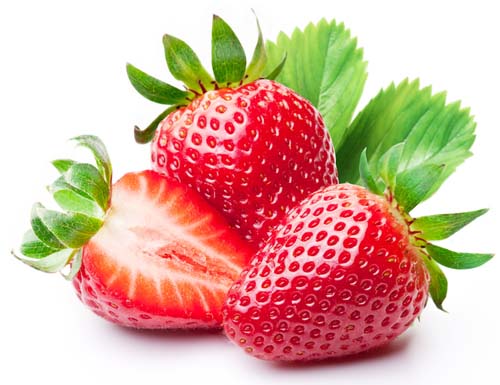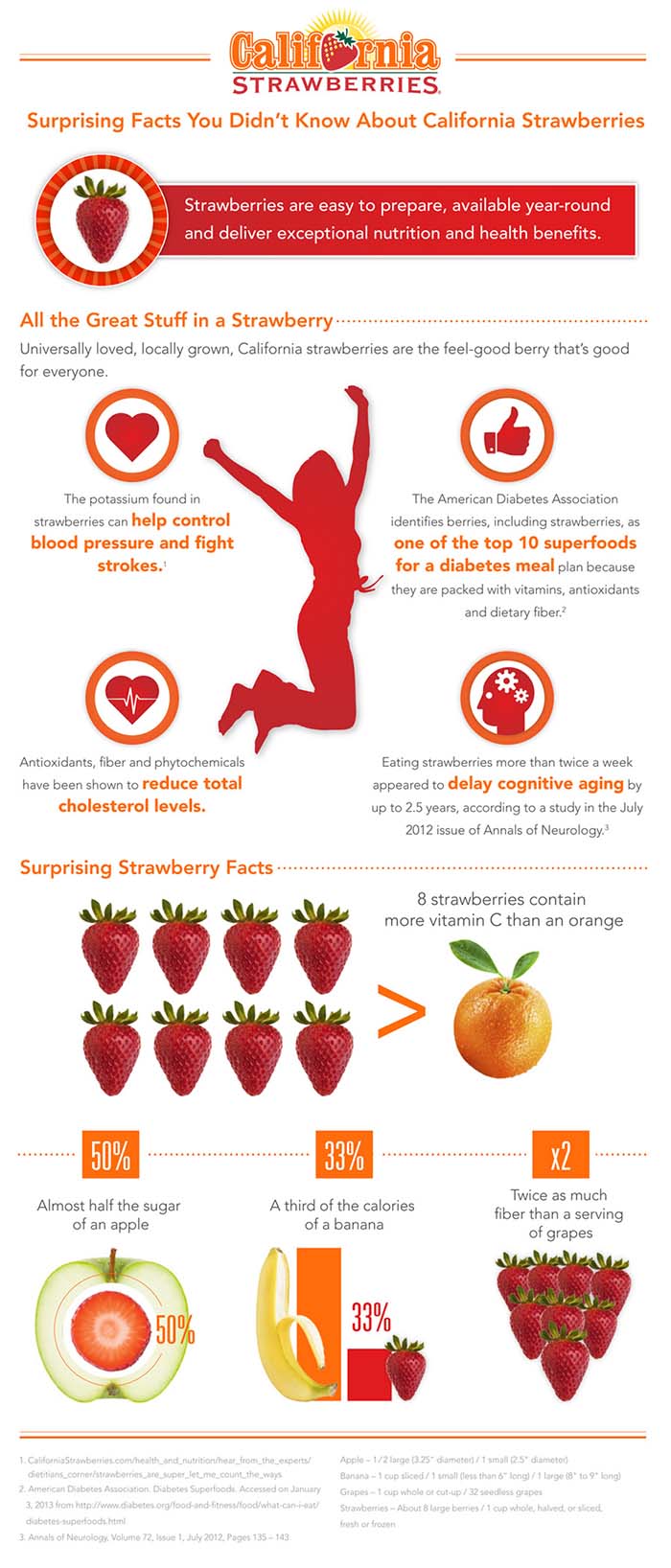One of the fruits associated with summer are strawberries. But can dogs eat strawberries just as humans can, and are strawberries for dogs safe to consume? What about the health benefits of feeding strawberries to dogs and are there any side effects? Let's take a closer look at the evidence.
If you've been wondering, “can I give my dog strawberries,” the answer is YES – dogs can eat strawberries and they are not toxic to dogs. In fact, there are many potential health benefits from feedings strawberries to dogs that I'll explore below.
However, like with most other fruits, vegetables and superfoods for dogs, it's important to only feed strawberries to your dog as an occasional treat. It should not be a regular meal for them because dogs did not evolve to eat fruit or berries on a regular basis.
Table of Contents
READ: Can Dogs Eat Raspberries?
What are strawberries?
The strawberry is a type of bright red fruit with a sweet taste of the Fragaria species. A modern strawberry that is most commonly eaten today is actually a hybrid of two wild strawberry varieties from Chile and North America.
Generally classified as berries, strawberries are low in calories and are an excellent source of important vitamins, minerals and antioxidants. Its nutritional and calorie content makes the strawberry a genuinely super food to eat for people and dogs.
This is what fresh raw strawberries look like:

Not only do strawberries look and taste delicious, but they pack a ton of nutrients, many of which have been observed in clinical trials to improve health of humans and animals.
In fact, when researching the effects of strawberries specifically, tons of studies have shown how beneficial it is to consume this summertime fruit/berry.
Strawberries for Dogs 101
Can Dogs Eat Strawberries?
 So can dogs eat strawberries safely? Yes, absolutely – dogs can eat strawberries and they are non-toxic to canines. Just remember to practice moderation and only give your dog strawberries as an occasional treat to spoil them and boost their general health.
So can dogs eat strawberries safely? Yes, absolutely – dogs can eat strawberries and they are non-toxic to canines. Just remember to practice moderation and only give your dog strawberries as an occasional treat to spoil them and boost their general health.
Strawberries provide many key nutrients and vitamins that can make them a powerfully nutritious snack for a dog.
These are the most important vitamins and minerals that strawberries contain:
- Vitamin B1 and B6
- Vitamin C
- Vitamin K
- Fiber
- Folic Acid
- Magnesium
- Manganese
- Potassium
- Omega-3 and Omega-6 fatty acids
Just like other berries for dogs, strawberries are known as nutritional powerhouses through plenty of research, and they make excellent, healthy treats for a dog.
Aside from the above vitamins, strawberries also contain powerful compounds and antioxidants, all of which have been observed to improve health in many ways:
Ellagitannins, which fight bacteria and may prevent cancer (1)
Procyanidins, a very healthy and powerful antioxidant (2)
Ellagic acid, another antioxidant responsible for many functions in the body (3)
Anthocyanins, which improve heart health (4)
Here's a science-based breakdown of all the health benefits of strawberries for dogs and people and how including this superfruit in your dog's diet can improve his health:
- Strawberries reduce the risk of many chronic diseases (5)
- Strawberries improve cardiovascular and heart health (6, 7, 8, 9)
- Strawberries regulate blood sugar and prevent diabetes (10)
- Strawberries may prevent various forms of cancer (11)
This is just a brief breakdown of potential health benefits from consuming strawberries yourself and giving strawberries to your dog in moderate amounts. Many of these benefits have been applied to other fruits and berries, such as blueberries and blackberries.
Berries for dogs
The above health benefits of strawberries largely stretch out into the whole group of foods known as berries. Looking at all of the research, it seems that as long as berries for dogs are safe to consume, it's a good idea to feed them as an occasional treat.
The four best types of berries for dogs are:
- Strawberries
- Blackberries
- Raspberries
- Blueberries
Including any or all of the above fruits in your dog's diet may significantly improve his health, provided you give them in moderation and as an occasional treat. If you like to cook for your dogs at home, then these can be great additions to homemade dog meals.
READ ALSO: Best Frozen Dog Treats Recipes for Hot Summer Days
11 Potential Benefits of Strawberries for Dogs

Now that we've looked at the clinical trials showing the benefits of strawberries for people and animals, there are some very specific reasons to feed strawberries to dogs. Note that this has not been observed in studies and is mostly based on theoretical knowledge.
The eleven potential health benefits of strawberries for dogs are:
1. Vitamin B1 and B6 play key roles in vital body functions in dogs.
Vitamin B1 (thiamine) helps convert glucose into energy and maintains muscular and nerve functions in the dog's body.
Vitamin B6 plays a crucial role in the use of amino acids within the canine body. Amino acids help promote the healthy growth of tissues and muscles.
2. The Vitamin C in strawberries aids in multiple health functions.
Strawberries have high levels of Vitamin C (ascorbic acid) which promote various healthy effects within a dog’s body, particularly improving the immune system.
Vitamin C is an antioxidant that helps reduce oxidative cell damage. It may also prevent autoimmune diseases and illnesses like cancer.
Vitamin C also combats degenerative conditions and dementia, and may potentially promote cartilage and collagen synthesis in canines.
3. Vitamin K aids in organ and blood health in dogs.
The Vitamin K supplied by strawberries serves multiple critical functions within the dog's body. First, it strengthens a dog’s teeth and bones, and by working with the calcium within the body it prevents blood clotting.
Second, Vitamin K also helps promote heart health in dogs and may help to avoid several heart diseases, as observed in human studies.
4. The dietary fiber in strawberries helps improve the digestive system.
Fiber is very important in the dog's diet, because it promotes all aspects of the digestive system. It regulates bowel movements, prevents diarrhea, flatulence, and constipation, and aids in weight loss in canines.
5. Folic acid is important for blood functions and health in dogs.
Vitamin B9, or folic acid, is necessary for the cellular division of red blood cells within bone marrow of a dog's body. Folic acid is responsible for metabolism and synthesis of fatty acids. It helps create hormones, neurotransmitters, and DNA.
6. Strawberries are a prime source of magnesium.
Magnesium is another mineral that dogs need because it promotes the production of protein, the proper absorption of all other vitamins, and bone growth. Strawberries, like many other berries, have a high amount of magnesium.
7. Manganese is necessary for proper dog's body operations.
Strawberries have manganese which helps the canine body properly use carbohydrates and protein from consumed foods. It is also involved in the production of enzymes that create energy and fatty acids.
8. Potassium aids with blood and muscle activities.
Potassium is a mineral that helps with electrolyte replacement, blood vessel function, and muscle development in the dog's body. It also directly impacts the quality of a dog’s heart and kidney health.
9. Strawberries include essential Omega-3 and Omega-6 fatty acids.
Omega-3 and Omega-6 fatty acids are vital to dogs for a variety of reasons, and strawberries contain some of them although not enough.
Providing sufficient amount of omega-3 and omega-6 essential fatty acids in the dog's diet will improve your dog's heart and eye health. They also help maintain healthy blood pressure and improve the condition of a dog’s skin and coat.
Finally, EPA and DHA found in omega-3 can fight canine arthritis and other joint related diseases, which is particularly important for older and senior dogs.
10. Strawberries contribute to reducing joint inflammation.
Alongside the anti-inflammatory effects of omega-3 and 6 in particular, strawberries contain many other compounds which were observed in studies to alleviate discomfort associated with arthritis and that may keep dogs’ joints supple, mobile and healthy.
11. Strawberries are a natural teeth whitener.
Strawberries contain malic acid which assists particles that stain teeth to break away leaving your dog with a white, bright smile.

“So, can my dog eat strawberries?”
Yes, your dog can eat strawberries safely and they are non-toxic to dogs. Furthermore, giving your dog strawberries can boost his health and improve many vital functions.
That said, remember to feed strawberries to your dog as an occasional treat and always in moderation. Dogs did not evolve to eat strawberries (or any other berries of fruits for that matter), so you must practice caution and not make it a staple of their diet.
The Bottom Line: Strawberries are safe for dogs to eat and they are an excellent, nutritionally dense treat to give to your dog in moderation.
READ: Can Dogs Eat Apples?
2 Potential Side Effects of Strawberries for Dogs
 With all the health benefits of feeding strawberries to dogs, there are a few things to watch out for, mostly related to overfeeding your pet on strawberries.
With all the health benefits of feeding strawberries to dogs, there are a few things to watch out for, mostly related to overfeeding your pet on strawberries.
Here are the two potential adverse effects of strawberries for dogs:
1. Gastrointestinal issues.
Due to high natural sugar levels, too many strawberries may upset your dog’s stomach, causing constipation or diarrhea. Dogs with sensitive stomachs are particularly susceptible to stomach pain and upset and may need to steer clear of large amounts of fruit.
2. Thyroid malfunction.
Strawberries contain goitrogens, a naturally occurring chemical found in various foods.
Goitrogens can interfere with and suppress thyroid function in dogs, causing the thyroid to underperform (also known as hypothyroidism). This issue may result in multiple side effects such as decreased energy levels and weight gain.
If not treated, over time the thyroid will overcompensate and develop a goiter, which is an inflammation of the dog's thyroid gland. If you feed your dog an excessive amount of strawberries, it may have an adverse impact on his thyroid.
Summary
Can Dogs Eat Strawberries?
 In conclusion, dogs can eat strawberries and this nutritionally powerful fruit is safe for them to consume.
In conclusion, dogs can eat strawberries and this nutritionally powerful fruit is safe for them to consume.
Not only that, but adding a little bit of strawberries to your dog's diet and given as an occasional treat and in moderation can provide several health benefits for a dog.
Strawberries are full of antioxidants, disease- and cancer-fighting properties. They provide fuel for incredibly important body functions, help encourage healthy heart and kidney function, and may prevent canine arthritis and other illnesses.
References
READ NEXT: 11 Best Superfoods for Dogs That May Improve Their Health













